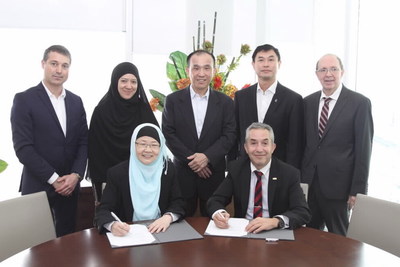SINGAPORE, April 6, 2018 /CNW Telbec/ - A*STAR's NanoBio Lab and Canada's Hydro-Québec today announced that they have signed a Memorandum of Understanding (MOU) to finance US$20 million for a joint laboratory for battery research. Housed in Singapore's biomedical research hub, Biopolis, the new facility will focus on making batteries more efficient and safer through the use of innovative nanomaterials.
Lithium-ion batteries are a popular choice for powering electronic devices, including tablets, fitness trackers and even vehicles, due to their high energy density, excellent durability and lightness. However, recent cases of exploding smartphones and hoverboards have placed these batteries in the spotlight, sparking consumer fear and safety concerns.
The joint laboratory aims to improve solid-state batteries, which are considered to be a safer alternative to lithium-ion batteries, as they do not use flammable liquid electrolytes. In particular, the lab will focus on developing new nanomaterials and nanotechnologies for electric vehicles and energy storage that are safe, efficient and cost-effective.
"The prevalence of electronic devices in our daily life and the quest for clean, renewable energy have led to increasing demand for more innovative and safer energy storage solutions. Since 2011, we have worked with Hydro-Québec to improve the performance and safety of existing batteries. Through in-depth technology exchange, we have created many interesting new materials, and we are delighted to significantly expand our collaboration in order to accelerate our technology R&D efforts towards commercialization," said Professor Jackie Y. Ying, who heads NanoBio Lab.
One of the American Institute of Chemical Engineers' 100 Modern Engineers of Our Time and a Fellow of the U.S. National Academy of Inventors, Prof. Ying is a world-renowned nanotechnology researcher whose lab has invented several techniques for producing unique nanostructures that are tailored for various biomedical, catalytic and energy applications.
Hydro-Québec is a global leader in battery materials research and is a major supplier of electricity, relying on clean, renewable energy in Canada. Recently, it announced the opening of a new Center of Excellence in Transportation Electrification and Energy Storage (CETEES), which is headed by Dr. Karim Zaghib. Dr. Zaghib is an international expert on energy technologies, who has been named one of the World's Most Influential Scientific Minds. CETEES has unique expertise in the development of battery and related technologies for the electrification of transport and creation of jobs in Québec.
"We approached Prof. Jackie Ying about seven years ago for a collaboration as we wanted to tap on her expertise in nanomaterials and nanotechnologies to develop new battery materials. Over the years, we have achieved excellent progress and are delighted to establish a joint research facility in this area with her new Lab. Together, we hope to contribute to more breakthroughs and advancements in safe battery technology, and look forward to manufacturing the new generation of solid-state batteries in Singapore and Québec," said Dr. Zaghib, General Director of Hydro-Québec's CETEES.
The joint laboratory will be housed in Biopolis and will employ over 30 researchers.
A*STAR Chairman Lim Chuan Poh said, "I congratulate NanoBio Lab and Hydro-Québec on the setting up of this joint laboratory on battery materials technology. This is an emerging technology which could pave the way for cleaner and more renewable energy sources to power the next-generation of devices and vehicles. We look forward to developing and commercializing innovative energy storage solutions through this collaboration."
About NanoBio Lab (www.nbl.a-star.edu.sg)
NanoBio Lab is a multidisciplinary lab that is committed to improving lives through scientific discovery and technological innovation. Using nanotechnology, we create new materials and systems with unique functions and enhanced properties for advanced applications. We work closely with hospitals and industry to shape the future of medicine, consumer care and energy. Our research focus includes high-precision drug delivery vehicles, biocompatible materials for cell culture and medical use, portable detection kits for infectious diseases and food pathogens, intelligent sensors for environmental pollutants and food fraud, organs-on-chip for toxicology testing, and innovative energy storage solutions. Our vision is to improve the world through nanotechnology. Under the direction of renowned nanotechnology researcher, Professor Jackie Y. Ying, the NanoBio Lab works at the intersection of chemistry, materials science, engineering, and medicine to develop new nanocomposites, biomaterials, devices and biosystems to tackle major global challenges. As a nationally funded Laboratory, we contribute toward the growth of Singapore's economy by nurturing research talents, creating portfolios of intellectual properties, and commercializing new technologies.
About the Agency for Science, Technology and Research (www.a-star.edu.sg)
The Agency for Science, Technology and Research (A*STAR) is Singapore's lead public sector agency that spearheads economic oriented research to advance scientific discovery and develop innovative technology. Through open innovation, we collaborate with our partners in both the public and private sectors to benefit society.
As a Science and Technology Organization, A*STAR bridges the gap between academia and industry. Our research creates economic growth and jobs for Singapore, and enhances lives by contributing to societal benefits such as improving outcomes in healthcare, urban living, and sustainability.
We play a key role in nurturing and developing a diversity of talent and leaders in our Agency and Research Institutes, the wider research community and industry. A*STAR oversees 18 biomedical sciences and physical sciences and engineering research entities primarily located in Biopolis and Fusionopolis.
About Hydro-Québec (www.hydroquebec.com)
Hydro-Québec generates, transmits and distributes electricity. It is Canada's largest electricity producer and is among the world's largest hydropower producers. Its sole shareholder is the Québec government. It uses almost exclusively renewable generating options, in particular hydropower, and supports the development of other sources of energy, such as wind and biomass, through purchases from independent power producers. Its research institute, IREQ, conducts R&D in energy efficiency, energy storage and other energy-related fields. Hydro-Québec invests $130 million in research every year.
SOURCE Hydro-Québec

Media Contacts: NanoBio Lab: Nidyah Sani ([email protected], +65 6824 7005) and Lynn Hong ([email protected], +65 6419 6597); Hydro-Québec: Jonathan Côté ([email protected], +1 514 289 3227)



Share this article